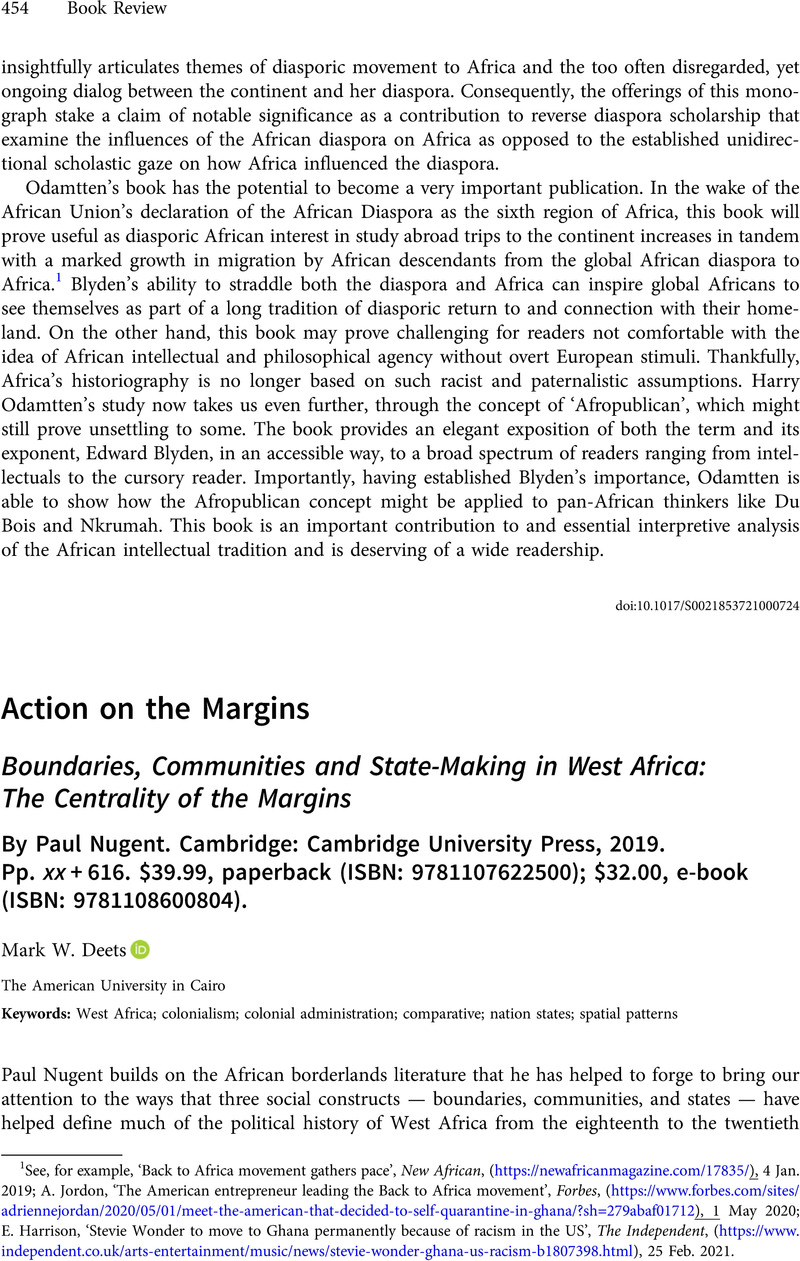No CrossRef data available.
Article contents
Action on the Margins - Boundaries, Communities and State-Making in West Africa: The Centrality of the Margins By Paul Nugent. Cambridge: Cambridge University Press, 2019. Pp. xx + 616. $39.99, paperback (ISBN: 9781107622500); $32.00, e-book (ISBN: 9781108600804).
Published online by Cambridge University Press: 31 December 2021
Abstract

- Type
- Book Review
- Information
- Copyright
- Copyright © The Author(s), 2021. Published by Cambridge University Press
References
1 Nugent, P. and Asiwaju, A. I. (eds.), African Boundaries: Barriers, Conduits, and Opportunities (London, 1996)Google Scholar; Nugent, P., Smugglers, Secessionists & Loyal Citizens on the Ghana-Togo Frontier: The Life of the Borderlands since 1914 (Athens, OH, 2002)Google Scholar; Dorman, S. R., Hammett, D. P., and Nugent, P. (eds.), Making Nations, Creating Strangers: States and Citizenship in Africa (Leiden, 2007)Google Scholar; Nugent, P., ‘Cyclical history in the Gambia/Casamance borderlands: refuge, settlement and Islam from c. 1880 to the present’, The Journal of African History, 48:2 (2007), 221–43CrossRefGoogle Scholar.
2 Tilly, C., Coercion, Capital, and European States, AD 990–1992 (rev. edn, Cambridge, MA, 1992)Google Scholar. By the ‘war and taxes formula’, I mean Tilly's claim that, in European states, ‘war made the state, and the state made war.’
3 Ibid.
4 Ibid. Nugent argues that it was mostly because elites in each country wanted it that way, because it best served their economic interests. See chapter 11, ‘Barnacle states and boundary lines: states, trade and urbanism in the Senegambia’.
5 Young, C., The African Colonial State in Comparative Perspective (New Haven, 1994)Google Scholar. See also the distinction between urban and rural frames of this history in Bates, R. H., Markets and States in Tropical Africa: The Political Basis of Agricultural Policies (Berkeley, 2005 [1981])Google Scholar. Mamdani, M., Citizen and Subject: Contemporary Africa and the Legacy of Late Colonialism (Princeton, 1996), 16–32Google Scholar.
6 Kopytoff, I. (ed.), The African Frontier: The Reproduction of Traditional African Societies (Bloomington, IN, 1987)Google Scholar.
7 For a few influential works on African ‘agency’, see Thornton, J., Africa and Africans in the Making of the Atlantic World, 1400–1800 (2nd edn, Cambridge, 1998)CrossRefGoogle Scholar; and Eltis, D., Morgan, P., and Richardson, D., ‘Agency and diaspora in Atlantic History: reassessing the African contribution to rice cultivation in the Americas’, American Historical Review, 112:5 (2007), 1329–58CrossRefGoogle Scholar. For Atlantic ‘creolization’, see Mark, P., ‘Portuguese’ Style and Luso-African Identity: Precolonial Senegambia, Sixteenth-Nineteenth Centuries (Bloomington, IN, 2002)Google Scholar; Sweet, J., Recreating Africa: Culture, Kinship, and Religion in the African-Portuguese World, 1441–1770 (Chapel Hill, NC, 2003)Google Scholar; Jones, H., The Métis of Senegal: Urban Life and Politics in French West Africa (Bloomington, IN, 2013)Google Scholar.
8 Nugent, Smugglers, Secessionists and Loyal Citizens; Cooper, F., Africa since 1940: The Past of the Present (Cambridge, 2002), 156–61CrossRefGoogle Scholar.
9 Scott, J. C., Seeing Like a State: How Certain Schemes to Improve the Human Condition Have Failed (New Haven, 1998)Google Scholar.



